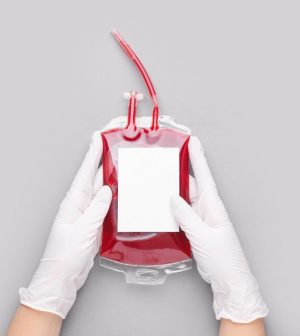- Could Your Grocery Store Meat Be Causing Recurring UTIs?
- Are You Making This Expensive Thermostat Error This Winter?
- Recognizing the Signs of Hypothyroidism
- 10 Strategies to Overcome Insomnia
- Could Artificial Sweeteners Be Aging the Brain Faster?
- Techniques for Soothing Your Nervous System
- Does the Water in Your House Smell Funny? Here’s Why
- Can a Daily Dose of Apple Cider Vinegar Actually Aid Weight Loss?
- 6 Health Beverages That Can Actually Spike Your Blood Sugar
- Treatment Options for Social Anxiety Disorder
Study: Blood Transfusion Post-Heart Attack May Be Critical for Those with Anemia

A blood transfusion following a heart attack could be a life-saving measure for patients with anemia.
A new evidence review published in the journal NEJM Evidence shows anemic patients had a slightly lower risk of death within six months of a heart attack if they were given more transfusions.
“The results of this analysis show that giving more blood to anemic patients with heart attacks can save lives at six months,” lead researcher Dr. Jeffrey Carson, chair of general internal medicine at Rutgers Robert Wood Johnson Medical School, said in a news release from the college.
Anemia is common among people hospitalized with a heart attack, Carson said. In anemia, a person’s blood can’t transport enough oxygen to the rest of the body.
Some doctors have speculated that blood transfusions might increase the amount of oxygen to the heart, improving heart attack patients’ chances of survival, Carson said.
However, transfusions might also increase the risk of infection or fluid buildup in these patients.
For this new study, researchers pooled data from four clinical trials evaluating transfusions in heart attack patients. The trials involved more than 4,300 patients who had both a heart attack and a low blood count, which is a sign of anemia.
In the trials, half of the patients received fewer blood transfusions, and the other half received more.
About 9.3% of patients who got fewer blood transfusions died within 30 days of their heart attack, compared with 8.1% of patients who were treated with more transfusions, results show.
Specifically, heart-related death within 30 days occurred in 5.5% of patients with fewer transfusions and 3.7% of patients who got more, the study says.
Overall, the risk of death or a second heart attack was about 2.4% lower in patients who received more blood transfusions, researchers found.
However, the results don’t definitively establish that more transfusions are better, because the main findings weren’t statistically significant, researchers noted.
More information
National Institutes of Health has more on anemia.
SOURCE: Rutgers University, news release, Dec. 23, 2024
Source: HealthDay
Copyright © 2026 HealthDay. All rights reserved.










